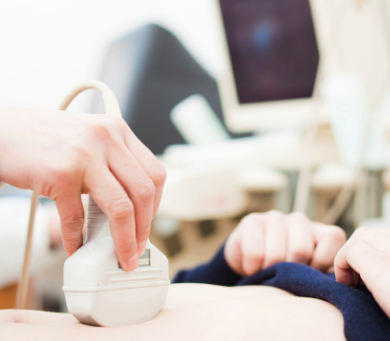Abdominal Ultrasound in Lebanon
Find the best clinics for Abdominal Ultrasound in Lebanon
No clinics available
Indonesia offers the best prices Worldwide
Price: $ 4

WHY US?
At Medijump, we're making medical easy. You can search, compare, discuss, and book your medical all in one place. We open the door to the best medical providers worldwide, saving you time and energy along the way, and it's all for FREE, no hidden fees, and no price markups guaranteed. So what are you waiting for?

Free

Best Price

Widest Selection

Risk-Free
What do you need to know about Abdominal Ultrasound in Lebanon?

The Abdominal Ultrasound, commonly referred to as an abdominal ultrasound, is a safe and non-intrusive imaging method that uses sound waves to generate detailed images of your abdominal organs. This radiation-free procedure is pivotal in diagnosing and monitoring conditions linked to vital organs like the liver, gallbladder, spleen, pancreas, kidneys, bladder, and abdominal aorta. Familiarizing yourself with the efficacy and safety of this procedure can help dispel any uncertainties you might harbor.
In Lebanon, be assured that this procedure is carried out by seasoned professionals leveraging the latest technology. Note that you may need to fast for several hours before the procedure as undigested food could hinder the sound waves, affecting the image clarity. If you have chronic health conditions, a frank discussion with your healthcare provider will ensure necessary accommodations and a successful procedure.
What is the cost of Abdominal Ultrasound in Lebanon?
The expenditure for the Abdominal Ultrasound in Lebanon can vary, influenced by factors such as the complexity of the examination, the type of care required, and your health insurance coverage. It's crucial to remember that most insurance providers generally cover this procedure, but it's wise to confirm this with your provider. If you lack insurance coverage, don't worry, many clinics offer financial assistance options.
What does the Abdominal Ultrasound Procedure involve in Lebanon?
The Abdominal Ultrasound, or abdominal ultrasound, is a process where an experienced technician applies a thin layer of gel to your abdomen. A handheld device, a transducer, is then glided over the area, emitting sound waves that bounce off your body's tissues and organs, creating echoes. These echoes transform into images on a monitor, offering a real-time glimpse into your internal structures. A thorough comprehension of the procedure can help mitigate any apprehensions.
In Lebanon, this procedure is conducted by adept healthcare professionals in a controlled environment. Typically taking less than an hour, the procedure should cause no discomfort. It's important to maintain open communication with your healthcare provider during the procedure and report any discomfort. Occasionally, you may be requested to hold your breath or adjust your position to improve imaging of certain areas.
How long should I plan to stay in Lebanon for a Abdominal Ultrasound Procedure?
The Abdominal Ultrasound, or abdominal ultrasound, is a rapid and efficient process, usually wrapping up within an hour. Although it's an outpatient procedure, meaning you're free to leave shortly after its completion, it's prudent to allot time for preparation and post-procedure consultation with your healthcare provider. You can effectively plan by considering the time required for these steps.
Typically, there's no obligatory period for you to stay in Lebanon post a Abdominal Ultrasound. But, if subsequent appointments or additional tests are recommended, factor these into your itinerary. Additionally, it would be sensible to consider any potential travel constraints or mandates due to public health regulations in Lebanon.
What's the recover period for Abdominal Ultrasound Procedures in Lebanon?
Arguably, one of the most appealing aspects of the Abdominal Ultrasound or abdominal ultrasound, is the nil recovery time. This non-intrusive, painless procedure allows you to immediately resume your regular routine. However, acquainting yourself with potential post-procedure scenarios and possible side effects beforehand is a smart move, bolstering your comfort and confidence.
Post-procedure in Lebanon, your healthcare provider will interpret the results with you and provide guidance on any necessary follow-up steps. As this procedure typically falls under outpatient care, you're free to leave shortly after its completion. As always, maintaining regular communication with your healthcare provider and strictly following their advice is vital for ongoing health and wellness.
What is the success rate for Abdominal Ultrasound Procedures in Lebanon?
The Abdominal Ultrasound, also known as an abdominal ultrasound, has an impressive track record of delivering clear, detailed images of the abdominal organs. This real-time imaging technique, which is free from radiation exposure, boasts a high success rate. The accuracy of the images significantly aids healthcare providers in diagnosing and monitoring a wide range of health conditions.
In Lebanon, this procedure is performed by seasoned professionals using advanced technology, thus ensuring its high success rate. Patient cooperation, such as adhering to instructions for fasting when required, also plays an integral role in the procedure's success. Hence, it's paramount to follow all given directions and maintain an open line of communication with your healthcare provider.
Are there Alternatives to Abdominal Ultrasound Procedures in Lebanon?
While the Abdominal Ultrasound or abdominal ultrasound is a widely used and effective diagnostic tool, there are alternative imaging procedures available. CT scans and MRIs, for instance, provide another means of visualizing the body's internal structures. These alternatives, however, may expose the patient to ionizing radiation, unlike an ultrasound. It's worthwhile to explore these alternative procedures to make an informed decision about your care.
In Lebanon, your healthcare provider will discuss these alternatives with you, considering your specific medical condition and needs. They will consider factors such as the nature of the condition, your medical history, and potential risks to suggest the most suitable option. Remember, the best course of action is to engage in a thorough discussion with your healthcare provider about all possible options before making a decision.
Whilst the information presented here has been accurately sourced and verified by a medical professional for its accuracy, it is still advised to consult with your doctor before pursuing a medical treatment at one of the listed medical providers
No Time?
Tell us what you're looking for and we'll reachout to the top clinics all at once
Enquire Now

Popular Procedures in Lebanon
Prices Start From $42

Prices Start From $23

Prices Start From $11

Prices Start From $11

Recommended Medical Centers in Lebanon for procedures similar to Abdominal Ultrasound

- Interpreter services
- Translation service
- Religious facilities
- Medical records transfer
- Medical travel insurance
- Health insurance coordination
- TV in the room
- Safe in the room
- Phone in the room
- Private rooms for patients available

- Interpreter services
- Translation service
- Religious facilities
- Medical records transfer
- Medical travel insurance
- Health insurance coordination
- TV in the room
- Safe in the room
- Phone in the room
- Private rooms for patients available

- Interpreter services
- Translation service
- Religious facilities
- Medical records transfer
- Medical travel insurance
- Health insurance coordination
- TV in the room
- Safe in the room
- Phone in the room
- Private rooms for patients available
